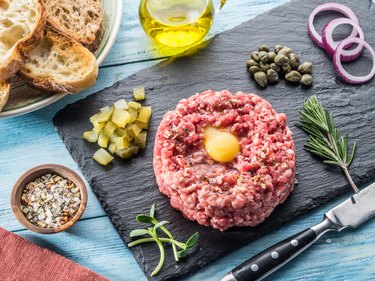
Protein is found in all animal foods, including chicken, fish, beef, eggs and dairy. If you want to eat more protein to build muscle mass or to recover from illness or injury, it's helpful to know which is the best source. Gram for gram, meat offers more protein than eggs.
Tip
When comparing an equal amount of meat and eggs, meat contains more than double the amount of protein.
Video of the Day
Eggs vs. Beef and Other Meats
Whether you prefer chicken, eggs or red meat, you're going to get a good dose of protein in a serving of each. According to the American Heart Association (AHA), appropriate serving sizes for protein foods are 3 ounces of meat, one whole egg or two egg whites.
Video of the Day
Following these recommendations, you would get 22 grams of protein in a serving of ground beef, 24 grams in a serving of chicken breast, 6 grams in one large whole egg and 7 grams in two large egg whites, per USDA FoodData Central.
You'll also get 31 grams of protein in 3 ounces of cooked venison, 19 grams in 3 ounces of bison meat, 18 grams in 3 ounces of lean-only lamb loin chops and 19 grams in a 3-ounce pork chop.
Read more: 5 Healthy Red Meat Recipes That Satisfy
Lean Protein Choices Are Best
Leaner meats are typically higher in protein because they contain less fat and more muscle. They're also healthier for you. Consuming too much saturated fat from animal foods can lead to high cholesterol and an increased risk of heart disease and stroke, according to the AHA.
Gram for gram, beef has almost five times the amount of fat as venison. Of course, this depends on the cut of beef, but in general beef has a high amount of saturated fat, as do lamb, pork and processed meats such as sausage, according to the Dietitians Association of Australia. Venison and bison are very lean meats and good choices — if you can find them.
Eggs are also higher in saturated fat than many types of meat. In 100 grams of egg protein, there are 10 grams of saturated fat, but 100 grams of venison only contains 4 grams of saturated fat. For less saturated fat, you get more protein by eating leaner meats.
Egg whites have no fat, and gram for gram they have almost the same amount of protein as whole eggs. If your goal is getting more protein from eggs while staying as healthy as possible, ditch the yolks.
Tips for Packing in Protein
The AHA says you don't have to give up red meat all together if you like to eat it, but you should follow a few tips:
- Stick to one serving. Fill the rest of your plate with fresh vegetables and whole grains so you don't feel deprived.
- Choose lean cuts. Usually these will be labeled as round, loin or sirloin.
- Use healthier cooking methods, such as baking, roasting, stewing and roasting.
- Trim as much fat as you can before cooking the meat, then drain all the melted fat off before serving.
The AHA also recommends eating minimal amounts of processed meats — but less is better. The American Cancer Society says there is sufficient evidence that eating processed meat causes cancer.
Lastly, vary your protein sources throughout the week, rotating between red meat, poultry and eggs. Add fish into the mix as well — not only is it high in protein, but it's also a rich source of omega-3 fatty acids, which the National Institutes of Health reports may improve heart health and protect against Alzheimer's disease and dementia.
There are also many plant foods that provide substantial amounts of protein, such as quinoa, lentils, nuts and beans, so it's not necessary to rely solely on beef and egg protein to meet your needs.
Read more: 9 Things You May Not Know About Eggs
- American Heart Association: "What is a Serving?"
- USDA FoodData Central: "Ground Beef, Cooked"
- USDA FoodData Central: "Venison/Deer, Roasted"
- USDA FoodData Central: "Lamb, Loin Chop, Cooked, Lean Only Eaten"
- USDA FoodData Central: "Bison, Cooked"
- USDA FoodData Central: "Pork Chop, Broiled or Baked, Lean Only Eaten"
- USDA FoodData Central: "Chicken Breast, Rotisserie, Skin Not Eaten"
- USDA FoodData Central: "Eggs, Grade A, Large, Egg Whole"
- USDA FoodData Central: "Eggs, Grade A, Large, Egg White"
- American Heart Association: "Saturated Fat"
- Dietitians Association of Australia: "Where Do I Find Saturated Fats in Food"
- American Heart Association: "Meat, Poultry, and Fish: Picking Healthy Proteins"
- American Cancer Society: "Known and Probable Human Carcinogens"
- National Institutes of Health: "Omega-3 Fatty Acids"